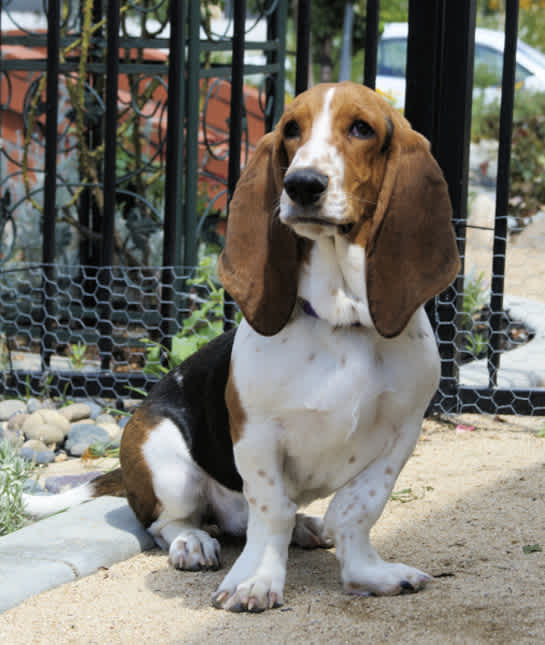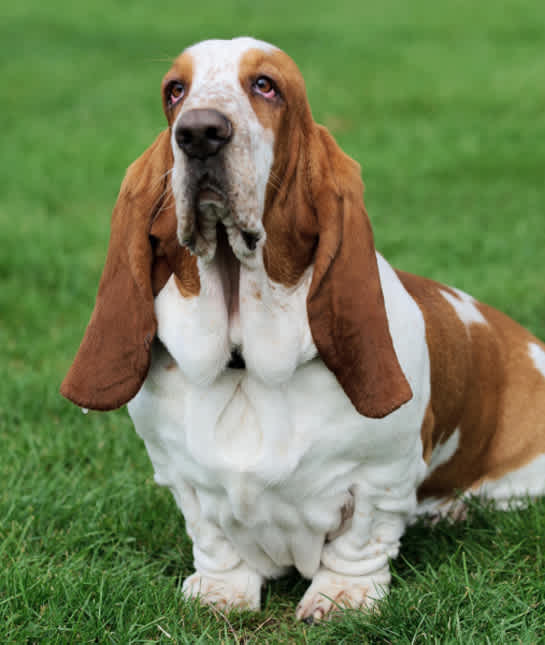 Basset Hounds were originally bred in France and Belgium (“basset” is French for “low”). It is thought that the friars of the Abbey of St. Hubert were responsible for crossing strains of older French breeds to create a low-built scenting hound that could plod over rough terrain while followed on foot by a human hunting partner tracking rabbit and deer. Their accuracy and persistence on scent made Bassets a popular choice for French aristocrats, for whom hunting was a way of life.
Basset Hounds were originally bred in France and Belgium (“basset” is French for “low”). It is thought that the friars of the Abbey of St. Hubert were responsible for crossing strains of older French breeds to create a low-built scenting hound that could plod over rough terrain while followed on foot by a human hunting partner tracking rabbit and deer. Their accuracy and persistence on scent made Bassets a popular choice for French aristocrats, for whom hunting was a way of life.
Bassets are very heavy-boned dogs with a large body on fairly short legs. Because they are bulky, bassets are slow maturing dogs, often not reaching full size until two years old. Bassets are immediately recognizable by their short, crooked legs, their long hanging ears and their large heads with hanging lips, sad expressive eyes, and wrinkled foreheads. The tail curves up and is carried somewhat gaily. The body is long and with the short legs gives bassets a rectangular appearance. The basset has a nice short, tight coat, with no long hair on legs or tail. Colors most commonly seen are tricolor or red and white but any hound color is acceptable.
The Basset Hound is among the most good natured and easygoing of breeds. This breed is amiable with dogs, other pets, and children, although children must be cautioned not to put strain on this and all dogs’ backs with their games. The Basset is calm inside, but needs regular exercise in order to keep fit. They prefer to investigate slowly, and love to sniff and trail. These are talented and determined trackers, not easily dissuaded from their course. Because of this, they may get on a trail and follow it until becoming lost. This dog tends to be stubborn and slow moving. Bassets have a loud bay that they use when excited on the trail.
Here, we summarized the most common health concerns you should look for over the lifetime of your Basset.
Here we go:
- Bloat
Gastric Dilatation and Volvulus, also known as GDV or Bloat, usually occurs in dogs with deep, narrow chests. This means your Basset is more at risk than other breeds. When a dog bloats, the stomach twists on itself and fills with gas. The twisting cuts off blood supply to the stomach, and sometimes the spleen. Left untreated, the disease is quickly fatal, sometimes in as little as 30 minutes. Your dog may retch or heave (but little or nothing comes out), act restless, have an enlarged abdomen, or lie in a prayer position (front feet down, rear end up). - Back Problems
Intervertebral disc disease (IVDD) is a common condition in dogs with long backs and short legs, which may include your Basset. The disease is caused when the jelly-like cushion between one or more vertebrae slips or ruptures, causing the disc to press on the spinal cord. If your dog is suddenly unable or unwilling to jump up or go upstairs, is reluctant to move around, has a hunched back, cries out, or refuses to eat or go potty, he is likely in severe pain. He may even drag his back feet or be suddenly paralyzed and unable to get up or use his back legs. If you see symptoms, don’t wait. Call us or an emergency clinic immediately! For less severe cases, rest and medication may resolve the problem. - Joint Disease
When Basset puppies are allowed to grow too quickly, the cartilage in their joints may not attach to the bone properly. This problem is known as osteochondritis dissecans or OCD. If this occurs, surgery may be required to fix the problem. It’s best to stick to our recommended growth rate of no more than four pounds per week. Don’t overfeed him and don’t supplement with additional calcium. Feed a large-breed puppy diet rather than an adult or a regular puppy diet. - Bleeding Tumor
Hemangiosarcoma is a type of bleeding tumor that affects Basset Hounds at greater than average incidence. These tumors commonly form in the spleen, but can form in other organs as well. Unbeknownst to a pet owner, the tumor breaks open and internal bleeding occurs. Some tumors can be volleyball-sized or larger before signs of sickness show. We often find clues that one of these tumors is present during senior wellness testing, so have his blood tested and an ultrasound performed at least yearly.
Sources:
https://www.petfinder.com/dog-breeds/basset-hound/
https://coonrapidspethospital.com/client-resources/breed-info/basset-hound/
Photo credit:
https://mom.com/momlife/19480-cool-facts-about-basset-hounds/
